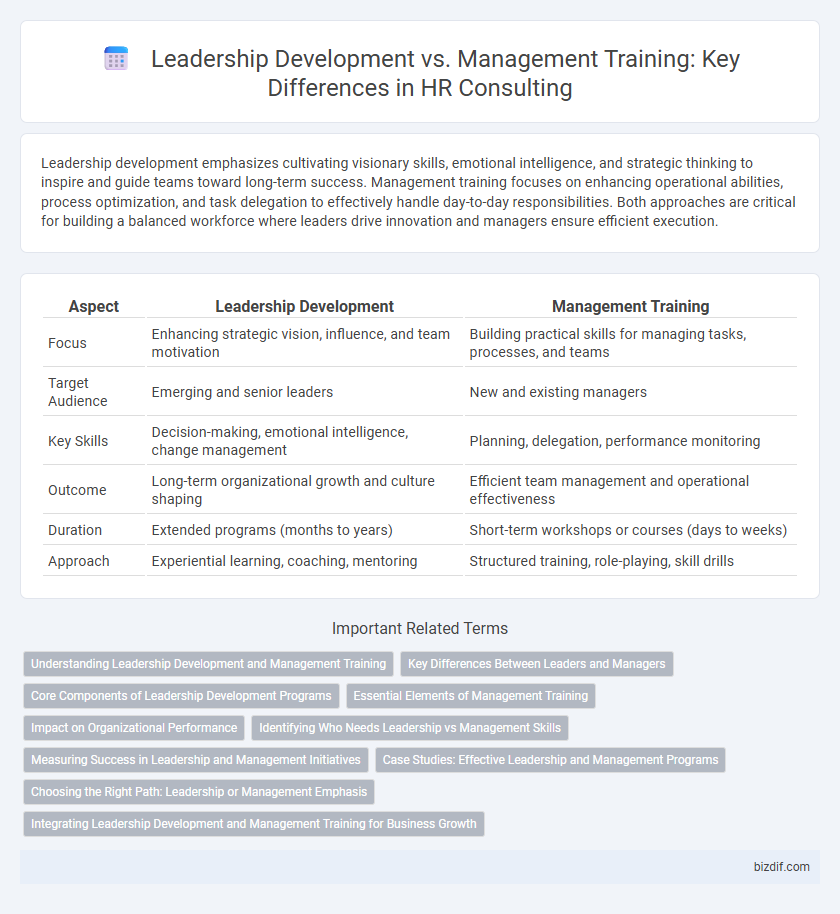Leadership development emphasizes cultivating visionary skills, emotional intelligence, and strategic thinking to inspire and guide teams toward long-term success. Management training focuses on enhancing operational abilities, process optimization, and task delegation to effectively handle day-to-day responsibilities. Both approaches are critical for building a balanced workforce where leaders drive innovation and managers ensure efficient execution.
Table of Comparison
| Aspect | Leadership Development | Management Training |
|---|---|---|
| Focus | Enhancing strategic vision, influence, and team motivation | Building practical skills for managing tasks, processes, and teams |
| Target Audience | Emerging and senior leaders | New and existing managers |
| Key Skills | Decision-making, emotional intelligence, change management | Planning, delegation, performance monitoring |
| Outcome | Long-term organizational growth and culture shaping | Efficient team management and operational effectiveness |
| Duration | Extended programs (months to years) | Short-term workshops or courses (days to weeks) |
| Approach | Experiential learning, coaching, mentoring | Structured training, role-playing, skill drills |
Understanding Leadership Development and Management Training
Leadership development focuses on cultivating strategic vision, emotional intelligence, and transformational skills essential for inspiring teams and driving organizational growth. Management training emphasizes operational competencies such as project planning, resource allocation, and performance monitoring to ensure efficient workflow and goal attainment. Both approaches address distinct skill sets critical for organizational success, with leadership development fostering innovation and management training enhancing process execution.
Key Differences Between Leaders and Managers
Leaders inspire vision and drive change by influencing people, whereas managers focus on planning, organizing, and executing tasks to achieve organizational goals. Leadership development emphasizes emotional intelligence, strategic thinking, and innovation, while management training centers on operational efficiency, process management, and performance evaluation. Understanding these key differences enables targeted HR consulting strategies that enhance both leadership impact and managerial effectiveness.
Core Components of Leadership Development Programs
Leadership development programs prioritize emotional intelligence, strategic thinking, and effective communication skills to cultivate visionary leaders who inspire and influence teams. Core components include self-awareness assessments, personalized coaching, and scenario-based learning to enhance decision-making and adaptive leadership capabilities. These programs emphasize long-term growth and transformational impact, distinguishing them from management training's focus on operational efficiency and procedural skills.
Essential Elements of Management Training
Effective management training focuses on essential elements such as strategic decision-making, conflict resolution, and performance management to enhance leadership capabilities. It emphasizes practical skills in budgeting, team coordination, and communication to drive organizational efficiency. Developing these core competencies ensures managers can execute company goals while motivating and guiding their teams effectively.
Impact on Organizational Performance
Leadership development enhances organizational performance by fostering strategic vision, driving innovation, and cultivating emotional intelligence among leaders. Management training primarily improves operational efficiency through skill-building in planning, organizing, and controlling resources. Combining both approaches results in balanced growth, aligning visionary leadership with effective execution to maximize overall business success.
Identifying Who Needs Leadership vs Management Skills
Effective HR consulting distinguishes between employees needing leadership development and those requiring management training by assessing their roles and potential impact on organizational growth. Leadership development targets individuals with strategic influence and the ability to inspire teams toward innovation, while management training focuses on employees responsible for operational efficiency and process oversight. Accurate identification ensures tailored programs that enhance both visionary capabilities and tactical execution within the workforce.
Measuring Success in Leadership and Management Initiatives
Measuring success in leadership development involves evaluating improvements in strategic decision-making, employee engagement, and long-term organizational impact, while management training success is often gauged by enhanced operational efficiency, task completion rates, and immediate team performance metrics. Key performance indicators (KPIs) such as 360-degree feedback scores, employee retention rates, and project delivery timelines provide quantifiable insights for both leadership and management programs. Implementing continuous assessment tools and aligning training outcomes with business objectives ensures accurate measurement of progress and return on investment in HR consulting initiatives.
Case Studies: Effective Leadership and Management Programs
Effective leadership development programs focus on enhancing emotional intelligence, strategic thinking, and decision-making skills, as demonstrated in case studies from Fortune 500 companies where leadership initiatives led to a 25% increase in employee engagement. Management training case studies highlight improvements in operational efficiency and team productivity through skills-based workshops and performance metrics tracking, often resulting in a 30% reduction in project completion times. Organizations integrating both leadership development and management training report comprehensive growth, improved succession planning, and sustained competitive advantage in dynamic business environments.
Choosing the Right Path: Leadership or Management Emphasis
Leadership development focuses on cultivating vision, emotional intelligence, and strategic thinking to inspire and influence teams, while management training emphasizes operational skills, process optimization, and performance metrics to ensure effective project execution. Organizations seeking long-term cultural transformation prioritize leadership development, whereas those aiming to improve day-to-day efficiency and team coordination benefit from targeted management training. Assessing company goals, existing skill gaps, and future growth plans helps determine whether a leadership or management emphasis delivers the highest return on investment in human capital.
Integrating Leadership Development and Management Training for Business Growth
Integrating leadership development and management training creates a comprehensive growth strategy that enhances organizational performance by cultivating visionary leaders and effective managers simultaneously. This combined approach elevates strategic decision-making, boosts employee engagement, and drives business innovation by aligning leadership capabilities with operational execution. Businesses that invest in unified programs experience increased adaptability, talent retention, and sustained competitive advantage in dynamic markets.
Leadership Development vs Management Training Infographic

 bizdif.com
bizdif.com